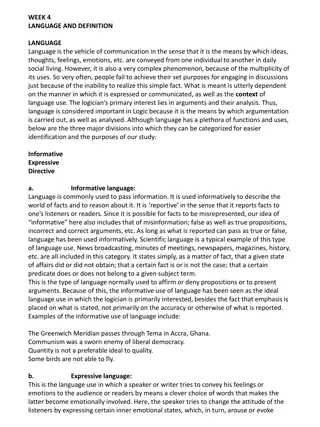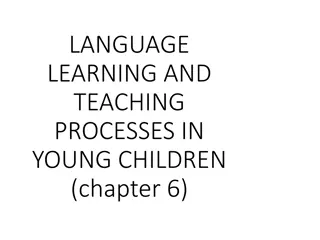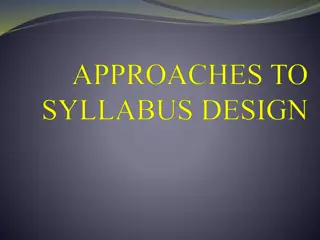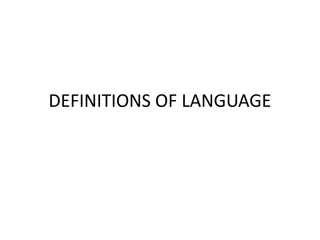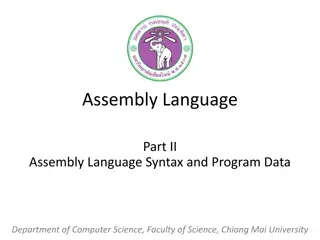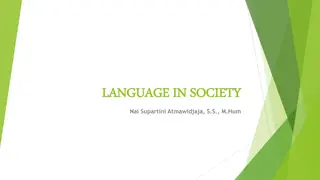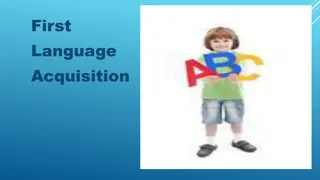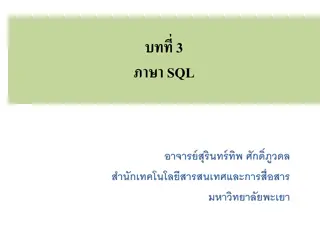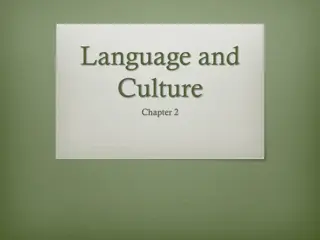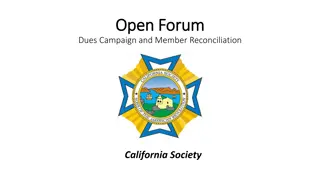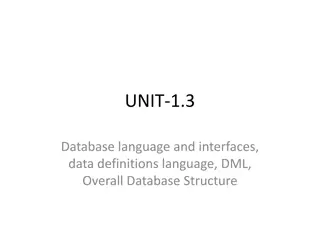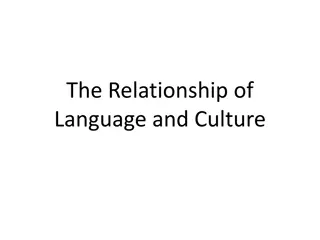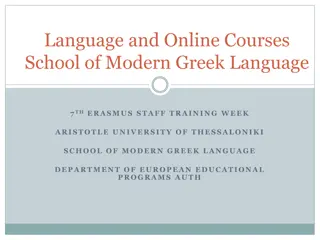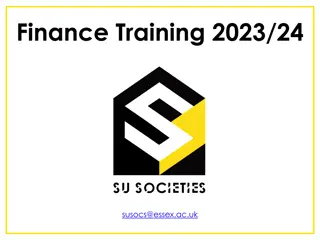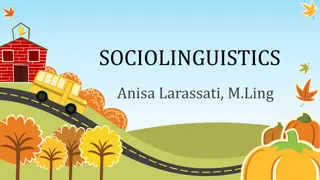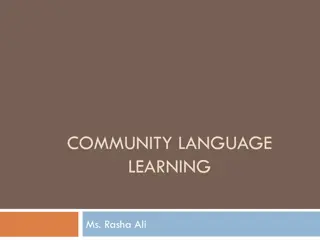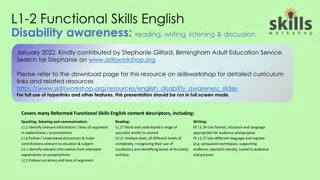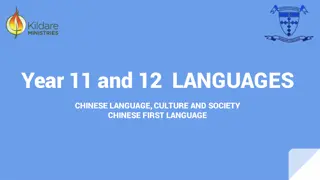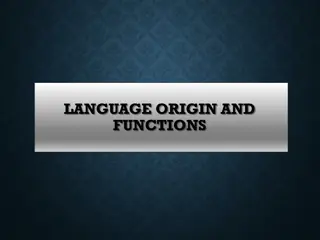Language Study Community – Enhance Your Language Skills
Joining a Language Study Group is a fantastic way to take your language learning to the next level. By leveraging the power of Group Study, you can immerse yourself in the language, enhance your understanding, and build confidence in your speaking abilities. Read full article \/\/explainlearning.com
1 views • 3 slides
Latin America Society of American Nuclear Society - Overview and Governance
The Latin American Section of the American Nuclear Society (LAS/ANS) was established in 1975 to represent nuclear professionals across Latin America. It focuses on promoting nuclear science and technology in various fields, facilitating research and education, organizing technical meetings, and fost
2 views • 43 slides
Academic Language Demands and Supports in Instructional Planning
Academic Language Demands and Supports are crucial in educational settings to ensure comprehension and usage of language by students. This content discusses embedding language demands in lesson plans, providing language supports, and peer review activities to enhance academic language skills. The fo
6 views • 10 slides
The Significance of Media in Language Learning
Media plays a crucial role in language learning by raising awareness of the ideology behind linguistic structures and providing valuable information on society and culture. Linguists are drawn to media language for research purposes and to understand its impact on language use and attitudes. Media s
12 views • 5 slides
Understanding Translation: Key Concepts and Definitions
Translation involves transferring written text from one language to another, while interpreting deals with oral communication. Etymologically, the term "translation" comes from Latin meaning "to carry over." It is a process of replacing an original text with another in a different language. Translat
11 views • 76 slides
Language and Communication in Society: Understanding Interactions
Explore the intricate relationship between language and society through lectures focusing on language in interaction, power dynamics, language contact and change, public space discourse, linguistic landscaping, and more. Delve into the shift from structural linguistics to societal communication, red
6 views • 28 slides
Understanding Language: Informative, Expressive, and Directive Uses
Language serves as a vital medium for communication, allowing the conveyance of ideas, thoughts, and emotions. It is a complex phenomenon with diverse uses. This text delves into the three major divisions of language use - informative, expressive, and directive. Informative language conveys facts, w
4 views • 6 slides
Understanding Civil Society: Concepts, Challenges, and Implications
Explore the dynamics of civil society, from its dense network of groups to its role in democracy. Delve into the typology of Civil Society Organizations, the connection between civil society and democracy, and the unique landscape of civil society in Norway. Engage in thought-provoking discussions o
0 views • 9 slides
Language Learning and Teaching Processes in Young Children
Development of language in young children is influenced by various factors such as their cultural and linguistic environment, unique characteristics, and interactions with adults. Optimal language development requires language stimulation from the environment. Varied cultural practices impact langua
1 views • 51 slides
Understanding Language in Stoicism: Significance and Corporeality
Language in Stoicism plays a crucial role in the process of assenting to impressions by focusing on corporeality, reason, and truth. It distinguishes between the mundane vocal sounds, articulated speech, and significant language to convey meanings effectively. The significance of language lies not i
2 views • 13 slides
Understanding Language Teaching Syllabus: Integration, Theory, and Approaches
Language Teaching Syllabus involves the integration of subject matter and linguistic elements, guided by theories of language and learning. Various approaches like Grammatical, Situational, Communicative, and Analytic are used to structure syllabi. Breaking language into parts aids in sequential lea
1 views • 28 slides
Exploring Language and Communication Through a Short Film
In this lesson, students will watch a 10-minute short film titled "The Most Beautiful Thing" by Cameron Covell. They will reflect on the value of learning another language, analyze how facial expressions and body language convey emotions, and develop empathy towards those facing language barriers or
0 views • 29 slides
Various Definitions of Language Throughout Linguistic History
Different linguists and scholars have offered various definitions of language over time. Sapir (1921) emphasized language as a method of communicating ideas, emotions, and desires through voluntary symbols. Bloch and Trager (1942) focused on the social aspect of language as a system of vocal symbols
1 views • 12 slides
Introduction to Assembly Language Syntax and Program Data
Learn about the syntax of assembly language and how data, variables, and constants are used in programming. Explore the basic instructions and the translation of high-level language into assembly language. Discover the role of an assembler in translating assembly language programs into machine langu
4 views • 36 slides
Enhancing Language Learning Across the Curriculum in B.Ed. 1st Year Course
Language Across the Curriculum (LAC) emphasizes that language learning should occur across all subjects, not just in language classrooms. It highlights the importance of incorporating language development into every learning activity, fostering multilingualism in schools. Language plays a crucial ro
2 views • 34 slides
Language in Society: Understanding the Interplay between Language and Social Structures
Exploring the intricate relationship between language and society, this material delves into how social structures influence linguistic behaviors and vice versa. Sociolinguistics and sociology of language are distinguished, shedding light on the significance of studying language in the context of so
1 views • 11 slides
Understanding First Language Acquisition Process
First language acquisition is the process through which humans develop the capacity to perceive, comprehend, and effectively use language to communicate. It primarily focuses on infants acquiring their native language. Basic requirements, caregiver speech features, and the acquisition schedule play
0 views • 19 slides
Comprehensive Overview of SQL Commands and Language Categories
In this detailed guide, you will learn about Structured Query Language (SQL) including its various commands such as Data Definition Language (DDL), Data Manipulation Language (DML), Data Control Language (DCL), and Transaction Control Language (TCL). Explore how SQL is used in Database Management Sy
0 views • 15 slides
Speech and Language Developmental Milestones: A Bilingual/Multilingual Perspective
Speech and language developmental milestones are crucial for children, regardless of their home language. These milestones encompass receptive language, expressive language, pragmatics, and articulation and phonology. Understanding how a child hears and talks from birth to one year is essential, as
1 views • 23 slides
Analyzing Writer's Language Use in English Language GCSE Component 2
In English Language GCSE Component 2, students learn to analyze how writers use language. The learning objective focuses on commenting, explaining, and analyzing language use with relevant subject terminology. The exam assesses students on their ability to interpret and explain a writer's thoughts,
0 views • 12 slides
Language and Culture Reflections: Diversity in Linguistic Emphasis
Exploring the correlation between language and culture, this content delves into how various languages reflect cultural values and priorities. Through examples like the Inuit language with rich vocabulary for snow and seals, the Shinzwani culture's unique word for mother and aunt, and the evolving l
0 views • 50 slides
Enhancing Civil Society Engagement in the Global Financing Facility (GFF)
Explore key tools and strategies for enhancing civil society engagement in the GFF, including the Civil Society Engagement Strategy, guidance notes, CSO resources, and the value of civil society in RMNCAH+N. Learn how civil society can contribute to advocacy, monitoring, accountability, and more tow
0 views • 16 slides
California Society Membership and Dues Reconciliation Processes
Dive into the membership and dues reconciliation procedures of the California Society, highlighting key dates, life membership programs, and documentation requirements. Learn about old and new life member programs, important deadlines, and the significance of each step in the reconciliation process
0 views • 24 slides
Introduction to Language Technologies at Jožef Stefan International Postgraduate School
This module on Knowledge Technologies at Jožef Stefan International Postgraduate School explores various aspects of Language Technologies, including Computational Linguistics, Natural Language Processing, and Human Language Technologies. The course covers computer processing of natural language, ap
0 views • 27 slides
Exploring Sociolinguistics: Language Variation and Social Factors
Sociolinguistics delves into the study of language variation influenced by social factors, examining the relationship between language and its social context. It explores various aspects like standard pronunciation, language choice, speech acts, language components, language variety, and factors suc
0 views • 73 slides
Exploring Sociolinguistics: Dialects, Varieties, and Language Borrowing
Sociolinguistics delves into the study of language variations within different social contexts. This includes examining concepts such as regional dialects, language borrowing, and the development of distinct linguistic varieties. From analyzing Basic English to exploring objections to Anglicisms and
0 views • 130 slides
Understanding Assembly Language Programming for Computing Layers
Assembly language is a low-level programming language that enables direct interaction with a computer's hardware components. This content explores the fundamentals of assembly language, the relationship between human-readable machine language and binary code, an assembly language program for multipl
0 views • 31 slides
Database Language and Interfaces Overview
A database management system (DBMS) requires appropriate languages and interfaces to handle queries and updates for data manipulation and control. This includes Data Definition Language (DDL), Data Manipulation Language (DML), Data Control Language (DCL), and Transaction Control Language (TCL). Each
0 views • 12 slides
The Intricate Relationship Between Language and Culture
Language serves as a vital tool for social interaction, intricately woven into the fabric of culture. It expresses, embodies, and symbolizes cultural realities. In the interplay of nature and culture, language immortalizes and transforms elements like roses, embodying essential aspects of society. T
0 views • 9 slides
Revitalizing American Nuclear Society: Strategies for Success
The content discusses the revitalization efforts of the American Nuclear Society, focusing on key areas such as organizational and leadership changes, refocused vision and strategy, accountability, and culture change. It outlines the challenges faced by the society in June 2011 and presents a roadma
0 views • 18 slides
Understanding Language Anxiety in Foreign Language Learning and Teaching
Explore the impact of language anxiety on students and teachers in foreign language learning and teaching contexts through insights from Dr. Christina Gkonou's research. Delve into the theoretical background, implications for language education, and real-life experiences shared at the Essex Language
0 views • 25 slides
School of Modern Greek Language: Courses, Seminars, and Assessment Overview
Explore the School of Modern Greek Language at Aristotle University of Thessaloniki offering language courses, seminars for teachers, and assessment exams. Founded in 1970, the school provides a multicultural environment for students worldwide, emphasizing Greek culture and offering a variety of lan
0 views • 17 slides
Understanding Society Finances: Roles, Accounts, and Reports
Roles and responsibilities of society finance leaders, managing society accounts, understanding weekly finance reports, and handling membership funds and other income sources. Emphasis on the importance of using only the official society account and receiving and reviewing weekly finance reports.
0 views • 36 slides
Understanding Sociolinguistics: Language and Society Interactions
Sociolinguistics is the study of the relationship between language and society, analyzing how language reflects and shapes social structures. It explores the uses of language within different communities, addressing power dynamics and societal norms. Sociolinguists examine language patterns, attitud
0 views • 63 slides
Effective Community Language Learning Method by Ms. Rasha Ali
Community Language Learning (CLL) method emphasizes understanding students' feelings and creating a supportive environment for language learning. This approach, influenced by the Counseling-Learning approach, focuses on building relationships, reducing anxiety, and promoting effective communication
1 views • 15 slides
Understanding Ableism and Challenging Ableist Language
Ableism is a form of discrimination favoring able-bodied individuals over disabled people. This resource explores the concept of ableism, the impact of language on the disabled community, and strategies to combat ableist language. It covers key vocabulary, shocking statistics on disability discrimin
0 views • 6 slides
Exploring Chinese Language, Culture, and Society in Years 11 and 12
Dive into the rich world of Chinese language, culture, and society in the Year 11 and 12 curriculum. Discover the significance of the Chinese language, its influence on global communication, and its role in various communities. Explore key aspects of modern China, including filial piety, generationa
0 views • 9 slides
The Origin and Functions of Language
Exploring the origin of language, this content delves into the historical perspective of when and how human language evolved. It discusses the role of language in human society, its functions in socialization, information exchange, commanding, persuading, and influencing. Additionally, it touches up
0 views • 8 slides
University of Toronto Graduate Nurses Student Society Overview
The Graduate Nurses Student Society (GNSS) at the University of Toronto represents and advocates for graduate nursing students. It provides leadership, social involvement, mentorship activities, and promotes student-faculty engagement. The society's current executive team and council structure are o
0 views • 12 slides
Exploring Language, Decision-Making, and Consumer Psychology
Delve into the intricate relationship between language and decision-making, discover how advertising utilizes language to influence consumer behavior, and examine the impact of semantics and the framing effect on our perceptions. Understand the elements of language, such as phonemes, morphemes, and
0 views • 76 slides






